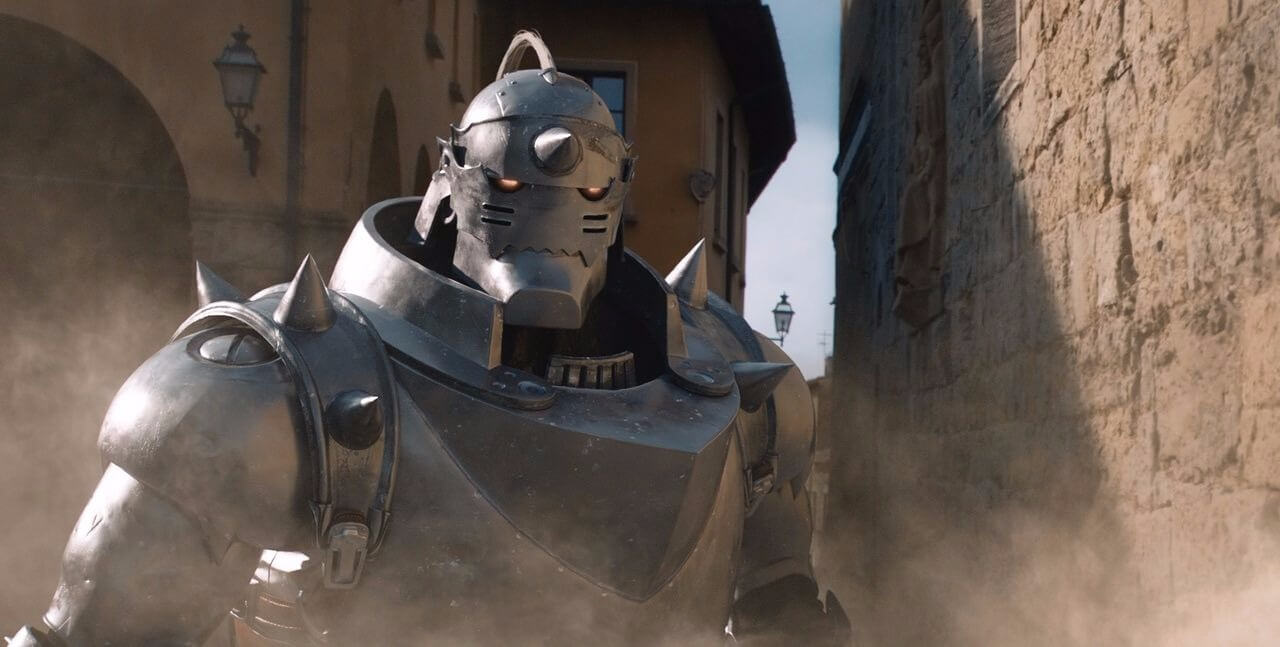
(Cue the theme music, aptly adapted from the anime for the film by Reiji Kitazato.) The military soon recognizes Ed's talents and employs him as the youngest state alchemist in the history of his country, Amestris. He and Al begin a quest for the Philosopher’s Stone, a fabled alchemical object believed to let alchemists bypass the law of equivalent exchange, in the hopes that its powers will allow them to repair their bodies. Ed’s childhood friend, Winry, outfits him with an automail arm and leg, and he learns that he can now perform alchemy without the use of a transmutation circle, a tool typically essential to the process. He did so by welding it to a giant suit of armor, which Al’s soul is able to manipulate as if it's his own body. For this, they paid a price: Ed lost his left leg and Al lost his entire body, and Ed was forced to sacrifice his right arm in order to keep Al’s soul tied to the material world. As a result of playing with powers they couldn’t understand or control, the brothers were sucked through a portal into another dimension, where they learn the fundamental Truth behind alchemy. That would be of the Elric brothers, Edward and Alphonse, and their quest to repair their bodies following an attempt of using alchemy to bring their mother back from the dead - a forbidden practice with what turns out to be an impossible goal. Thankfully, focusing on the crux of the original story is what the live-action adaptation does best. That doesn’t even include the very complicated rules for how alchemy - the practice of which relies primarily on the scientific (not magical) law of equivalent exchange - works. It involves a civil war, factional political squabbling, a giant government conspiracy, and each of the seven deadly sins made flesh as artificial, superpowered humans called homunculi. It deals with massive philosophical themes, juggling questions about the nature of truth and the existence of God, and whether consciousness without a body is enough to confirm that a person exists. The FMA storyline, in all iterations, is. While it might have seemed that the film's biggest adaptation hurdle was going to be the special effects - what with characters possessing the ability to transmute matter into pretty much anything, shoot fire from their hands, and move around in bodiless suits of metal - in reality, the trickiest sticking point was always going to be time.
#Fullmetal alchemist movie series#
And deviation, of course, is a necessity when you’re boiling down a big series into a 120-minute film.įullmetal Alchemist is an ambitious movie, condensing about the first third of the original series and parts of Fullmetal Alchemist: Brotherhood's final arc into a little over two hours. Fans present another problem: Anime geeks are passionate, and any deviation from source material whatsoever might be met with responses ranging between scorn and fury. Then there’s special effects: Much of anime is packed with fantastical elements, which, when recreated with CGI, inevitably wreak havoc on a film’s budget. Right off the bat, there’s the representation issue: Anime is a Japanese art form whose characters, for a variety of reasons, often do not look Japanese, and in a Hollywood desperately in need of more diversity, this presents some casting complications. Adapting animation-first material has presented a special set of challenges, and anime series are particularly tricky - something that the filmmakers behind Ghost in the Shell and Death Note found out last year.
#Fullmetal alchemist movie movie#
Sori, who also directed a live-action Ping Pong film, admitted plans for a sequel: “As long as there is a lot of people that watched this movie and loved this movie, we’d love to do that.” he said.When Netflix announced that it would distribute Japanese director Fumihiko Sori’s live-action adaptation of Hiromu Arakawa’s beloved Fullmetal Alchemist property - first a manga and, later, two separate anime series - many anime fans felt a familiar mix of excitement and skepticism. “I feel like through this film we were able to actually achieve those things as well as connecting the visual effects between the characters.”


“It’s very hard to balance action, visual effects, acting and all those components,” he admitted.

In an interview with Anime News Network, Director Fumihiko Sori acknowledged that when adapting an animated series into a live-action, it can be difficult to balance and appropriate the various components of a series fans love. The #FMANetflix movie is a shining example of how Anime to live-action should be done and that it’s possible to be done well. Just watched the #FullmetalAlchemist movie on #Netflix and it was surprisingly great! 😃 It is the best live-action #anime movie I’ve seen to date.


 0 kommentar(er)
0 kommentar(er)
